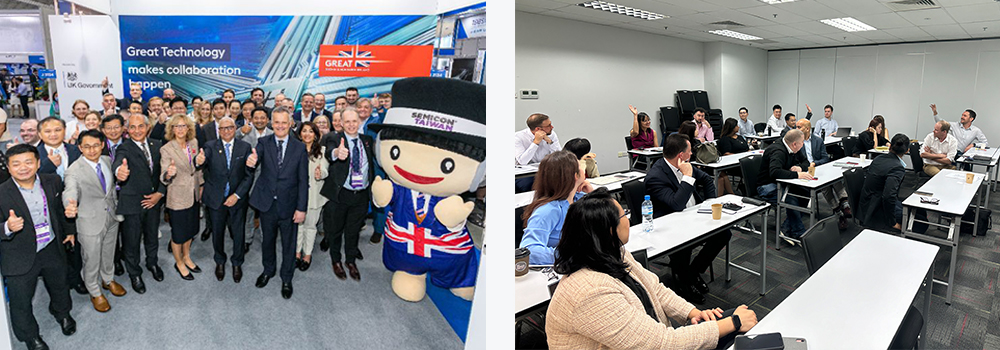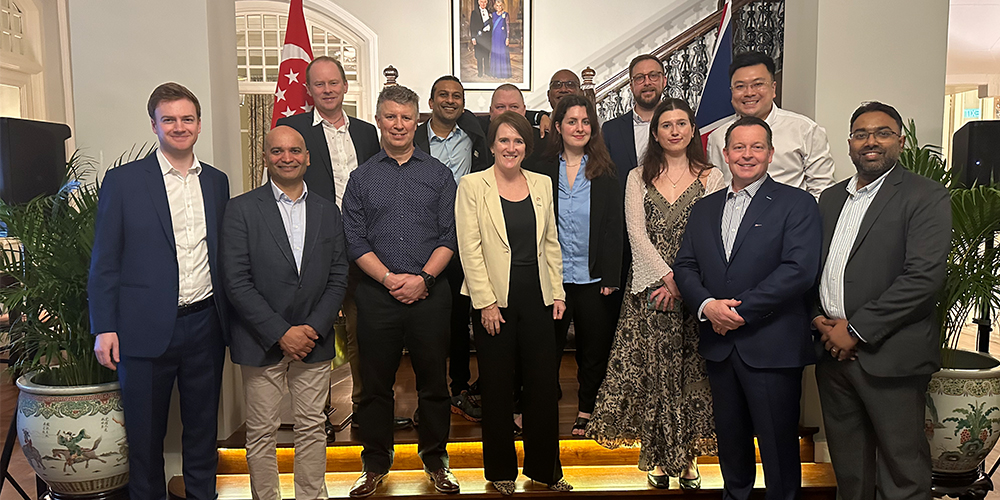The UK-APAC Tech Growth Programme is turning one year old. In case you haven’t taken part yet, it’s a great way to dip your toes in the APAC market to understand your commercial opportunities, kick start conversations with potential customers and partners and hone your long-term growth strategy.
Best part: most of its support is free (or heavily subsidised)!
But you don’t have to take our word for it. Let’s have a look at some of the milestones from the last 12 months and hear from the programme’s alumni.
Skills workshops
A big part of succeeding in APAC is doing your homework and learning from others’ achievements and mistakes. We organised six informative sessions to set you on the right path – and all these sessions are available for you to watch now.
If you’re just getting started, this workshop will tell you how to self-assess your market expansion readiness – illustrated with real-life case studies.
Before you hop on the plane to Taipei, Seoul or Singapore, it’s also important to brush up on your cultural understanding. This ‘sixth sense’ can be crucial to closing the deal you’re working on – as our in-market business development experts can attest.
Next, you have to start thinking about your IP, contracts, local entity, compliance and – above all – getting paid! This intermediate session is exactly about this important side of cross-border expansion, with guest experts from Lewis Silkin and Acclime.
We also discussed local talent management in high-tech economies like Japan, Korea and Taiwan. How do you go about hiring your first local employee? And – most importantly – how much is it going to cost you? Our partners have this covered for you.
We then focused on Southeast Asia – another vast and diverse market with tremendous opportunities for UK tech firms. Our Singapore-based partner Orissa International gave an excellent steer on what’s out there and how to get started.
To wrap up the season, we invited some of our top in-house salespeople in Asia to get into the nitty-gritty of commercial negotiations in APAC – because none of the above will be any good if you can’t close that ground-breaking deal.
During this series, we’ve had hundreds of founders and CEOs tuning in live and on demand. Some of the comments we received described the series as “very smooth”, “no-nonsense” and “a great starter pack”.
And several of the attendees ‘advanced to the next level’ of the programme – which includes activities like …
Pitch events
You may be surprised to hear this, but big Asian corporates aren’t perfect, well-oiled machines.
In fact, as the tech world continues to accelerate, keeping up with the latest trends is a tall order, even for companies with R&D budgets to rival entire economies. They’re always on the lookout for someone like you – an innovator with world-changing tech and a killer business model.
So, we put both sides of the equation in a room together and watched the sparks fly.
At one event, Dai-Ichi Life – one of Japan's leading insurers – heard pitches from six innovative UK insurtech and healthtech startups with solutions that could boost Dai-Ichi’s digitisation efforts to address the issues of aging societies and labour shortages. The winner of the contest – Rest Less, a pioneering digital community designed to help the over-50s get the most from life – is now in discussions with Dai-Ichi to explore potential commercial collaboration.
Atsushi Izu – Head of Dai-Ichi’s London Innovation Lab – said: “It was a wonderful opportunity to meet a diverse range of impressive companies.”
Another event saw eight startups in the fields of energy transition and infrastructure pitch to a major Japanese trading house, Sumitomo Corporation Europe (SCEU), which is looking for innovative smart energy solutions. The winner of the event, Arenko – a provider of an energy asset management solution - was invited to SCEU’s HQ in London for deep-dive discussions around their technology and possible collaborative options.
In total, during the first year, we put over two dozen of the most innovative startups from the UK in front of some of the largest Asian brands – all here in London – opening doors to partnerships, PoCs and perhaps even investments and M&As.
And we have more events coming up with companies like Shimizu, Toto and FujiFilm, so watch this space!
In-country missions
But sometimes, you just have to go see the opportunity for yourself.
The UK government has a long tradition of supporting cross-border commerce with international missions. And, through the UK-APAC Tech Growth Programme, these missions have been highly commercially focused and results-driven.
With the semiconductor industry near top of the UK’s growth sector list, we supported delegations to Semicon Taiwan in September 2023 and Semicon Korea in February 2024. A dozen delegates – the cream of the crop of the UK’s semiconductor scene – attended close to 100 pre-validated, one-to-one meetings with Asian customers and partners. Importantly, our on-the-ground teams ensured these meetings were with the right people, fully briefed beforehand and properly followed up.
Dr Tom Wilson, Chief Commercial Officer at Paragraf, said the Korea mission “provided an excellent opportunity to meet a mix of investors, potential customers, partners and members of our supply chain.”
And Rae Hyndman, CEO of Scotland-based Clas-SiC Wafer Fab, told us: “This was our first time to Semicon Taiwan, and we found it extremely useful. We already have Taiwanese customers, but this increased our connections and helped us gain new leads.”
 The UK Government’s booth at Semicon Taiwan [left]; a market briefing session for mission delegates [right]
The UK Government’s booth at Semicon Taiwan [left]; a market briefing session for mission delegates [right]
We estimate that the immediate commercial pipeline resulting from these two missions alone is in the high eight-figure range.
We also supported the Digital Economy Agreement Singapore mission in March 2024, a follow-on to Southeast Asia Tech Week. We organised briefings covering business development essentials in the region, such as handling of intellectual property and the Singaporean tech ecosystem, which prepared the delegates for two days of corporate networking, business matching and evening receptions.
Nigel Wallis, Director & Service Manager of Moisture Control & Measurement Ltd, shared his thoughts on the opportunities provided by the mission: “I need to say a big ‘thank you’ for the efforts made by the Intralink team. It’s impressive to see so many possibilities delivered to us in such a short timeframe.”
 Kara Owen, British High Commissioner to Singapore [centre] with UK delegates during the Singapore mission
Kara Owen, British High Commissioner to Singapore [centre] with UK delegates during the Singapore mission
The Singapore mission resulted in the closure of a seven-figure deal for one delegate, and the start of commercial conversations with major Singaporean public and private entities for others, including with Singapore General Hospital and My Republic.
Being part of a mission is an excellent litmus test for your market readiness and your target market’s appetite for your tech. But missions alone rarely result in done deals. For that, you need …
Business development initiatives
Expanding into a new market is hard. So why not let someone experienced, knowledgeable and based in your target market take the lead? This is the basic concept of a Business Development Initiative, or a ‘BDI’, for short.
Our teams in Japan, Korea, Taiwan, Southeast Asia, Australia and New Zealand had the privilege of working with 13 incredible UK scaleups to help them take their expansion to the next level.
Japan, in particular, has emerged as a pivotal market for UK startups and scaleups seeking new customers or partners, serving as a testbed for innovative solutions to many global challenges — from localising production to addressing environmental concerns. We wrote much more about these trends recently here.
We supported the Japanese expansion of Accelerated Materials (optimising nanotechnology discovery using AI), Brill Power (battery management technology), Natcap (nature intelligence platform), and Spaceflux (space situational services), to name a few.
South Korea also stood out as an attractive market for British tech companies, bolstered by Korean President Yoon and First Lady Kim Keon Hee’s 2023 state visit to the UK at the invitation of King Charles.
Korea has ambitions to lead in strategically selected high-tech verticals – which include adoption of innovative technologies from abroad. This was exemplified in a BDI we ran for causaLens, whose causal inference technology represents a significant leap forward in machine intelligence. Their on-the-ground initiative greatly enhanced their commercial traction with several Korean chaebol, resulting in PoC discussions with LG AI and LG CNS.
Similarly, other parts of the APAC region are seeing growing interest in UK tech firms – whether that’s because of Southeast Asia’s rapidly growing infrastructure and middle class, or due to Australia’s and New Zealand’s ease of doing business and high levels of tech readiness. Riding these overarching trends, we supported companies including travel tech pioneer Transreport and Wyld Networks – a satellite connectivity company.
One BDI participant, who preferred to stay anonymous, said: “An excellent experience, great professionalism and we are delighted with the results so far - with big expectations for the future.”
We estimate that the near-to-mid-term commercial pipeline generated for the BDI participants amounts to over £100 million, based on the sales and licensing deals currently on the table. And that’s truly game-changing money for tech scaleups.
Opportunity reports
But look, it takes a while to get to a point where your product is ready to be taken overseas. And where overseas is not always an easy question to answer. Oftentimes, the wise thing to do is to weigh your options carefully.
So, we also published a series of deep-dive opportunity reports highlighting some of the sectors and geographies where UK tech companies are most likely to find success.
For example, we identified Japan as a lucrative market for companies working on quantum technologies. Japan was one of the leaders of the early quantum computing race in the 1990s and is now investing heavily to reclaim the pole position. It runs several Quantum Innovation Hubs where scientists and entrepreneurs – with both public and private backing, both domestic and foreign – work together to commercialise quantum technologies. This collaboration is expected to lead to a domestic market worth up to £1.7 billion by 2030.
And, while it’s no secret that Taiwan is a powerhouse of semiconductor innovation and production, the ways in which British firms can enter this market are subtle. Our report advises that the biggest opportunities lie in the “upstream” area of the semicon ecosystem: IP, EDA tools and materials, to name a few. And it elaborates on the practicalities of selling into Taiwanese semicon giants, which can be tricky but not insurmountable.
We also shone light on opportunities for UK tech providers in fast-growing economic clusters like Thailand and Vietnam, and Singapore and Malaysia.
Our reports have been downloaded hundreds of times, and the library is ever-growing, so be sure to revisit the section on our website.
Next steps
It’s been a jam-packed year with a great number of tangible outcomes.
But there’s much more to come – from opportunities to pitch to some of the world leading brands, to additional free in-depth reports and chances for direct engagement with potential customers.
The UK has a tremendously talented pool of scientists, engineers and entrepreneurs, and APAC continues to be a region where many of our innovations can find commercial success and financial backing.
We continue to help make that happen. So, visit our website, follow us on LinkedIn and apply for the UK-APAC Tech Growth Programme. We’ll see you there in year two.
For more information and to apply to join the UK-APAC Tech Growth Programme, click here
You can also contact our programme manager, Tom Miller, at tom.miller@intralinkgroup.com